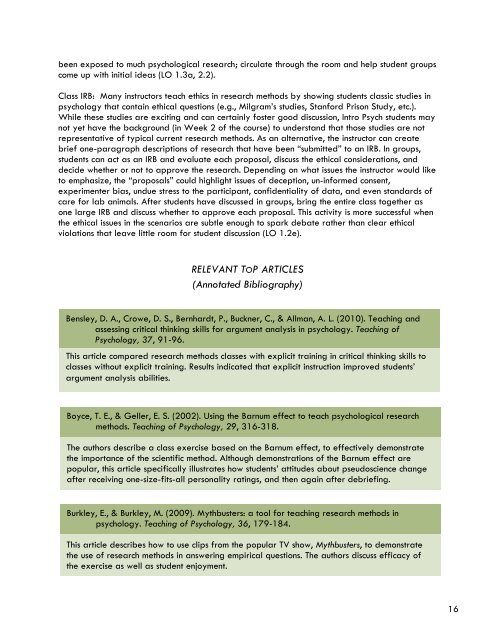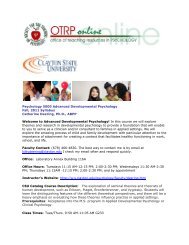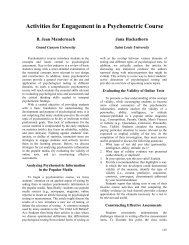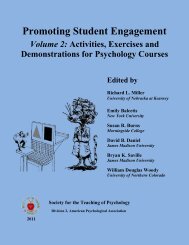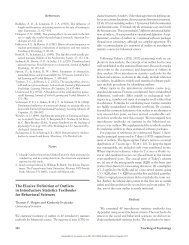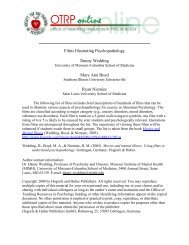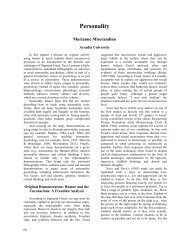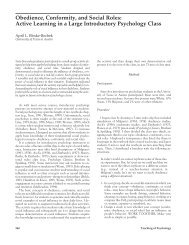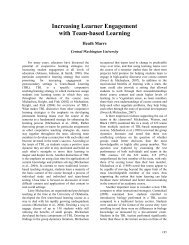INTRODUCTORY PSYCHOLOGY TEACHING PRIMER Early Career ...
INTRODUCTORY PSYCHOLOGY TEACHING PRIMER Early Career ...
INTRODUCTORY PSYCHOLOGY TEACHING PRIMER Early Career ...
You also want an ePaper? Increase the reach of your titles
YUMPU automatically turns print PDFs into web optimized ePapers that Google loves.
een exposed to much psychological research; circulate through the room and help student groups<br />
come up with initial ideas (LO 1.3a, 2.2).<br />
Class IRB: Many instructors teach ethics in research methods by showing students classic studies in<br />
psychology that contain ethical questions (e.g., Milgram’s studies, Stanford Prison Study, etc.).<br />
While these studies are exciting and can certainly foster good discussion, Intro Psych students may<br />
not yet have the background (in Week 2 of the course) to understand that those studies are not<br />
representative of typical current research methods. As an alternative, the instructor can create<br />
brief one-paragraph descriptions of research that have been “submitted” to an IRB. In groups,<br />
students can act as an IRB and evaluate each proposal, discuss the ethical considerations, and<br />
decide whether or not to approve the research. Depending on what issues the instructor would like<br />
to emphasize, the “proposals” could highlight issues of deception, un-informed consent,<br />
experimenter bias, undue stress to the participant, confidentiality of data, and even standards of<br />
care for lab animals. After students have discussed in groups, bring the entire class together as<br />
one large IRB and discuss whether to approve each proposal. This activity is more successful when<br />
the ethical issues in the scenarios are subtle enough to spark debate rather than clear ethical<br />
violations that leave little room for student discussion (LO 1.2e).<br />
RELEVANT TOP ARTICLES<br />
(Annotated Bibliography)<br />
Bensley, D. A., Crowe, D. S., Bernhardt, P., Buckner, C., & Allman, A. L. (2010). Teaching and<br />
assessing critical thinking skills for argument analysis in psychology. Teaching of<br />
Psychology, 37, 91-96.<br />
This article compared research methods classes with explicit training in critical thinking skills to<br />
classes without explicit training. Results indicated that explicit instruction improved students’<br />
argument analysis abilities.<br />
Boyce, T. E., & Geller, E. S. (2002). Using the Barnum effect to teach psychological research<br />
methods. Teaching of Psychology, 29, 316-318.<br />
The authors describe a class exercise based on the Barnum effect, to effectively demonstrate<br />
the importance of the scientific method. Although demonstrations of the Barnum effect are<br />
popular, this article specifically illustrates how students’ attitudes about pseudoscience change<br />
after receiving one-size-fits-all personality ratings, and then again after debriefing.<br />
Burkley, E., & Burkley, M. (2009). Mythbusters: a tool for teaching research methods in<br />
psychology. Teaching of Psychology, 36, 179-184.<br />
This article describes how to use clips from the popular TV show, Mythbusters, to demonstrate<br />
the use of research methods in answering empirical questions. The authors discuss efficacy of<br />
the exercise as well as student enjoyment.<br />
16


